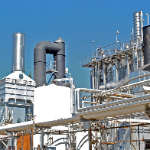
Increase Natural Gas Energy Efficiency by Sidel Systems USA
Please find below the
Finalist Evaluation
Judges'' comments
SUBJECT: Climate CoLab Judging Results
Proposal: Increase Natural Gas Energy Efficiency
Thank you for participating in the 2015 Climate CoLab Industry contest, and for the time you spent in creating and revising your entry.
The Judges have strongly considered your proposal in this second round of evaluation, and have chosen to not advance it as a Finalist for this contest.
We, the Judges and contest Fellows, are truly grateful for your contribution to the Climate CoLab and for your commitment to address climate change.
We encourage you to keep developing your work. Transfer it to the Proposal Workspace to re-open it, make edits, add collaborators, and even submit it into a future contest. You can do so by logging into your account, opening your proposal, selecting the Admin tab, and clicking “Move proposal”.
We hope you will stay involved in the Climate CoLab community. Please support and comment on proposals that have been named Finalists and vote for which proposal you would like to be nominated as the contest’s Popular Choice Winner.
If you have questions, please contact the Climate CoLab staff at admin@climatecolab.org
Keep up the great work. And thank you again for being a part of this mission to harness the world’s collective efforts to develop and share innovative climate change solutions.
2015 Climate CoLab Judges
This proposal would need to point to an industrial sector that is underserved, and show how it can help this industry. For additional comments, please refer to the Semi-Finalist Evaluation.
Semi-Finalist Evaluation
Judges'' ratings
| • | Novelty: | |
| • | Feasibility: | |
| • | Impact: | |
| • | Presentation: |
Judges'' comments
SUBJECT: Your proposal has been selected as a Semi-Finalist!
Congratulations! Your proposal, Increase Natural Gas Energy Efficiency in the Industry contest, has been selected to advance to the Semi-Finalists round.
You will be able to revise your proposal and add new collaborators if you wish, from July 1st until July 14, 2015 at 23:59pm Eastern Time.
Judges' feedback are posted under the "Evaluation" tab of your proposal. Please incorporate this feedback in your revisions, or your proposal may not be advanced to the Finalists round. We ask you to also summarize the changes that you made in the comment section of the Evaluation tab.
At the revision deadline listed below, your proposal will be locked and considered in final form. The Judges will undergo another round of evaluation to ensure that Semi-Finalist proposals have addressed the feedback given, and select which proposals will continue to the Finalists round. Finalists are eligible for the contest’s Judges Choice award, as well as for public voting to select the contest’s Popular Choice award.
Thank you for your great work and again, congratulations!
2015 Climate CoLab Judges
Waste heat recovery is a good idea. Question is, how could this be applied more broadly than it is now?
It is common knowledge to engineers that waste heat recovery potential is large. But the limiting factor is too often that it is not cost effective to recover it.
The researcher should take into consideration the following points and edit the proposal.
- The economic justification of heat recovery systems depends on the temperature and quality or cleanliness of the waste streams; the magnitude of waste heat; the system’s cost-benefit ratio; and, most importantly, the cost of energy—particularly fuels, natural gas, and coal.
- A large number of technologies and systems are available to recover heat from medium (600°–1,200°F or 316° - 650°C) and high-temperature (>1,200°F or 650°C) clean gases discharged from industrial processes. In most cases, there is an upper temperature limit (>1,600°F or 870°C) that restricts use of the available equipment.
- Several systems are available to recover heat from lower temperature clean gases and liquids; however, current energy prices prevent their wide-scale use.
- Next to the cost of energy, the equipment performance of waste heat recovery technologies is the most important issue preventing use of waste heat systems in all temperature ranges. For example, a large amount of waste heat is available in high-temperature processes; however, the waste heat streams contain many contaminants that severely limit use of existing waste heat recovery systems. On the other hand, thermodynamic limitations and the lack of economically justifiable, efficient energy conversion systems prevent wide-scale use of heat recovery from low-temperature waste heat streams.
- In many cases, the available technologies and hardware can economically recover large amounts of heat in the form of hot air (gas), liquid (water), or steam. However, in most cases there is very little use of such energy sources in the plant. The best form of energy conversion seems to be electricity that is easily transportable or can be exported to the utility company. Currently available technologies and systems need several improvements before they are accepted by the industry. Additional R&D efforts in this area could offer large returns.
No comments have been posted.